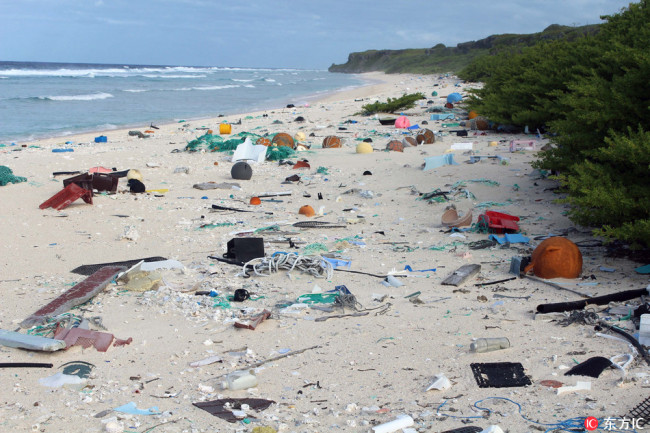


Plastic littering the Henderson Island, an uninhabited British territory in the South Pacific Ocean. [File Photo: IC]
The China Navigation Company (CNCo) and the Secretariat of the Pacific Regional Environment (SPREP) signed a memorandum of understanding (MoU) on Wednesday to address critical waste management issues in Pacific islands.
Known as the "Moana Taka Partnership", this MoU allows for CNCo vessels to carry containers of recyclable waste from eligible Pacific island ports, to be sustainably treated and recycled at suitable ports in the Asia-Pacific.
"This historic partnership will be of great benefit to our Pacific islands, and one for which we are very appreciative to The China Navigation Company," said director general of SPREP Kosi Latu.
"Our Pacific islands face an immense waste management challenge. With many geographical limitations, the Moana Taka Partnership can help us address the problem of taking our recyclable waste off island for proper recycling. This is a great step, or shall we say paddle, in the right direction."
A total of 21 countries are eligible for these opportunities, including American Samoa, Cook Islands, Commonwealth of Northern Mariana Islands, Guam, Fiji, French Polynesia, Kiribati, Republic of the Marshall Islands, Federated States of Micronesia, Nauru, New Caledonia, Niue, Palau, Papua New Guinea, Samoa, Solomon Islands, Timor Leste, Tonga, Tuvalu, Vanuatu and Wallis and Futuna.
CNCo managing director James Woodrow, said, "China Navigation has provided sustainable shipping solutions to the Pacific islands for 80 years.
He said they stepped in as the communities in the Pacific islands were facing pressing environmental challenges.
Woodrow said there was a critical need for sustainable waste management in the region, and they worked urgently with the SPREP and UN Environment to put this partnership in place.
Under the agreement, Pacific island countries who have insufficient or inappropriate landfill space to store waste, have inadequate waste treatment facilities, and the financial inability to ship recyclable waste are eligible for this opportunity.
The types of materials that are considered recyclable include plastics, aluminium cans, waste oil and ozone depleting substances.
"Better waste management is absolutely critical for Pacific island nations. Landfills should be the last option and throwing it all in the ocean is not an option. We need to innovate, and this kind of public-private partnership is the way forward. Only when we work together can we overcome one of the biggest environmental challenges of our time," said executive director of UN Environment Erik Solheim.
 Fire brigade in Shanghai holds group wedding
Fire brigade in Shanghai holds group wedding Tourists enjoy ice sculptures in Datan Town, north China
Tourists enjoy ice sculptures in Datan Town, north China Sunset scenery of Dayan Pagoda in Xi'an
Sunset scenery of Dayan Pagoda in Xi'an Tourists have fun at scenic spot in Nanlong Town, NW China
Tourists have fun at scenic spot in Nanlong Town, NW China Harbin attracts tourists by making best use of ice in winter
Harbin attracts tourists by making best use of ice in winter In pics: FIS Alpine Ski Women's World Cup Slalom
In pics: FIS Alpine Ski Women's World Cup Slalom Black-necked cranes rest at reservoir in Lhunzhub County, Lhasa
Black-necked cranes rest at reservoir in Lhunzhub County, Lhasa China's FAST telescope will be available to foreign scientists in April
China's FAST telescope will be available to foreign scientists in April "She power" plays indispensable role in poverty alleviation
"She power" plays indispensable role in poverty alleviation Top 10 world news events of People's Daily in 2020
Top 10 world news events of People's Daily in 2020 Top 10 China news events of People's Daily in 2020
Top 10 China news events of People's Daily in 2020 Top 10 media buzzwords of 2020
Top 10 media buzzwords of 2020 Year-ender:10 major tourism stories of 2020
Year-ender:10 major tourism stories of 2020 No interference in Venezuelan issues
No interference in Venezuelan issues
 Biz prepares for trade spat
Biz prepares for trade spat
 Broadcasting Continent
Broadcasting Continent Australia wins Chinese CEOs as US loses
Australia wins Chinese CEOs as US loses